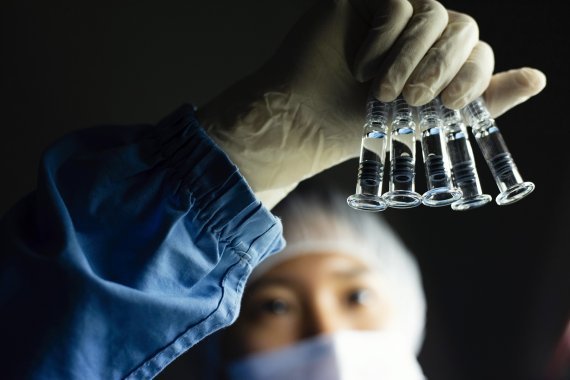Which COVID-19 vaccines will Korea aim for?
Vaccines differ in efficacy, distribution methods, affordability
By Lim Jeong-yeoPublished : Nov. 24, 2020 - 17:44

With countries scurrying to secure sufficient COVID-19 vaccines being developed by leading global pharmaceutical firms, attention is paid to the pros and cons of each, in terms of their efficacy, affordability and distribution conditions.
While Pfizer and Moderna boast average efficacy rates of nearly 95 percent, their mRNA vaccines are expensive and require temperatures of between minus 20 degrees Celsius and minus 70 degrees Celsius for storage and delivery. They have put $15 to $25 price tags on their vaccines, according to their deals with the US government.
AstraZeneca’s AZD1222, developed with Oxford University and third in the race toward a COVID-19 vaccine, has an average efficacy rate of 70 percent, lower than those of Pfizer and Moderna.
But as a viral vector vaccine, it can be stored and distributed at temperatures ranging between 2 to 8 degrees Celsius. AstraZeneca has, from the early phase of research, said that it will not seek to profit from the COVID-19 vaccine. The company had said that it would supply its vaccine at $3 to $5 per dose. The Associated Press, in an article Monday, said that “AstraZeneca has reached agreements with governments and international health organizations that put its cost at about $2.50 a dose.”
Korea, meanwhile, is home to SK Bioscience, which is working with AstraZeneca to manufacture its COVID-19 vaccine. SK Bioscience, which is also developing its own recombinant vaccine for COVID-19 in the phase 1 clinical trial, is preemptively manufacturing AZD1222 according to AstraZeneca’s wishes.
To ward off an infectious disease fully, at least 60 percent of the population needs to be inoculated.
The Korean government so far has not specified how it plans to secure these vaccines, and what specific deals are being discussed with which companies.
“There is no reason to be fearful of vaccine supply in Korea, be assured that we have nothing to worry for,” stressed Kwon Jun-wook, deputy director of the Korea Disease Control and Prevention Agency, in the daily briefing Tuesday.
“We are seeking to secure enough vaccine for 30 million people,” Kwon said. “Sufficient that they may receive the shot twice if needed.”
As of 2020, South Korea has a population of over 50 million.
The country does have a comparatively small number of COVID-19 cases, which ironically has delayed the nation’s endeavors for treatment and vaccine development.
So far, the nation has had 31,353 COVID-19 confirmed cases of the novel coronavirus since January. As of Tuesday, 4,121 are being treated under quarantine, of whom 79 are seriously ill. Lives lost to COVID-19 here stand at 510.
Korea has reinstated Level 2 social distancing from Tuesday, following a sudden spike in the number of confirmed patients rising over 300 per day. Deputy Director Kwon urged the Korean people to put off year-end gatherings altogether, lest nationwide efforts to curb the spread of the disease be rendered meaningless.
By Lim Jeong-yeo (kaylalim@heraldcorp.com)
While Pfizer and Moderna boast average efficacy rates of nearly 95 percent, their mRNA vaccines are expensive and require temperatures of between minus 20 degrees Celsius and minus 70 degrees Celsius for storage and delivery. They have put $15 to $25 price tags on their vaccines, according to their deals with the US government.
AstraZeneca’s AZD1222, developed with Oxford University and third in the race toward a COVID-19 vaccine, has an average efficacy rate of 70 percent, lower than those of Pfizer and Moderna.
But as a viral vector vaccine, it can be stored and distributed at temperatures ranging between 2 to 8 degrees Celsius. AstraZeneca has, from the early phase of research, said that it will not seek to profit from the COVID-19 vaccine. The company had said that it would supply its vaccine at $3 to $5 per dose. The Associated Press, in an article Monday, said that “AstraZeneca has reached agreements with governments and international health organizations that put its cost at about $2.50 a dose.”
Korea, meanwhile, is home to SK Bioscience, which is working with AstraZeneca to manufacture its COVID-19 vaccine. SK Bioscience, which is also developing its own recombinant vaccine for COVID-19 in the phase 1 clinical trial, is preemptively manufacturing AZD1222 according to AstraZeneca’s wishes.
To ward off an infectious disease fully, at least 60 percent of the population needs to be inoculated.
The Korean government so far has not specified how it plans to secure these vaccines, and what specific deals are being discussed with which companies.
“There is no reason to be fearful of vaccine supply in Korea, be assured that we have nothing to worry for,” stressed Kwon Jun-wook, deputy director of the Korea Disease Control and Prevention Agency, in the daily briefing Tuesday.
“We are seeking to secure enough vaccine for 30 million people,” Kwon said. “Sufficient that they may receive the shot twice if needed.”
As of 2020, South Korea has a population of over 50 million.
The country does have a comparatively small number of COVID-19 cases, which ironically has delayed the nation’s endeavors for treatment and vaccine development.
So far, the nation has had 31,353 COVID-19 confirmed cases of the novel coronavirus since January. As of Tuesday, 4,121 are being treated under quarantine, of whom 79 are seriously ill. Lives lost to COVID-19 here stand at 510.
Korea has reinstated Level 2 social distancing from Tuesday, following a sudden spike in the number of confirmed patients rising over 300 per day. Deputy Director Kwon urged the Korean people to put off year-end gatherings altogether, lest nationwide efforts to curb the spread of the disease be rendered meaningless.
By Lim Jeong-yeo (kaylalim@heraldcorp.com)







![[KH Explains] How should Korea adjust its trade defenses against Chinese EVs?](http://res.heraldm.com/phpwas/restmb_idxmake.php?idx=644&simg=/content/image/2024/04/15/20240415050562_0.jpg&u=20240415144419)










![[Today’s K-pop] Stray Kids to return soon: report](http://res.heraldm.com/phpwas/restmb_idxmake.php?idx=642&simg=/content/image/2024/04/16/20240416050713_0.jpg&u=)